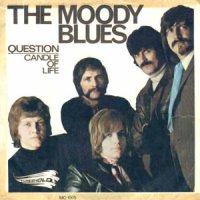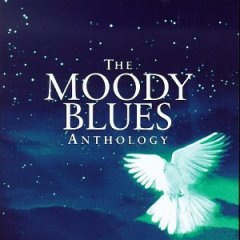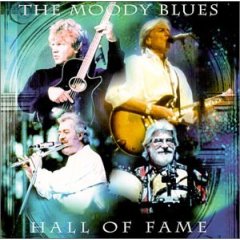
The Moody Blues were an English rock band formed in Birmingham in May 1964. The band initially consisted of drummer Graeme Edge, guitarist/vocalist Denny Laine, keyboardist/vocalist Mike Pinder, multi-instrumentalist/vocalist Ray Thomas, and bassist/vocalist Clint Warwick. Originally part of the British beat and R&B scene of the early–mid 1960s, the band came to prominence with the UK No. 1 and US Top 10 single "Go Now" in late 1964/early 1965. Laine and Warwick left the band by the end of 1966, being replaced by guitarist/vocalist Justin Hayward and bassist/vocalist John Lodge. They embraced the psychedelic rock movement of the late 1960s, with their second album, 1967's Days of Future Passed, being a fusion of rock with classical music that established the band as pioneers in the development of art rock and progressive rock. It has been described as a "landmark" and "one of the first successful concept albums".

A Night at Red Rocks with the Colorado Symphony Orchestra is a live album by The Moody Blues, recorded from a live performance at the Red Rocks Amphitheatre on 9 September 1992. This performance was the first time The Moody Blues performed in concert backed by a full orchestra. The concert was held in celebration of the 25th anniversary of their second album, Days of Future Passed, which had featured the London Festival Orchestra. The full video of this concert was broadcast as a fundraising broadcast for PBS in the United States.

On the Threshold of a Dream is the fourth album by The Moody Blues, released in April 1969 on the Deram label. The album reached the top of the album charts, the group's first No. 1 album in the UK.

David Justin Hayward is an English musician. He was the guitarist and frontman of the rock band the Moody Blues from 1966 until that group's dissolution in 2018. He became the group's principal vocalist and its most prolific songwriter over the 1967–1974 period, and composed several international hit singles for the band.

To Our Children's Children's Children is the fifth album by the Moody Blues, released in November 1969.

Raymond Thomas was an English musician, singer and songwriter. He was best known as a founding member of the English progressive rock band the Moody Blues. His flute solo on the band's 1967 hit single "Nights in White Satin" is regarded as one of progressive rock's defining moments. In 2018, he was posthumously inducted into the Rock and Roll Hall of Fame as a member of the Moody Blues.

Graeme Charles Edge was an English musician, songwriter and poet, best known as the co-founder and drummer of the English band the Moody Blues. In addition to his work with the Moody Blues, Edge worked as the bandleader of his own outfit, the Graeme Edge Band. He contributed his talents to a variety of other projects throughout his career. In 2018, Edge was inducted into the Rock and Roll Hall of Fame as a member of the Moody Blues.

John Charles Lodge is an English musician, best known as bass guitarist, vocalist, and songwriter of the longstanding rock band the Moody Blues. He has also worked as a record producer and has collaborated with other musicians outside the band. In 2018, Lodge was inducted into the Rock and Roll Hall of Fame as a member of the Moody Blues.

"Voices in the Sky" is a hit 1968 single by the progressive rock band the Moody Blues, and it was written by their lead guitarist Justin Hayward. It was released as a single in June 1968, with "Dr. Livingstone, I Presume" on the B-side. It was later released on their 1968 album In Search of the Lost Chord, and was the first of two singles from that album, the other being "Ride My See-Saw".

"Never Comes the Day" is a 1969 single by the progressive rock band the Moody Blues. It was written by band member Justin Hayward, and was the only single released from their 1969 album On the Threshold of a Dream.

"Question" is a 1970 single by the English progressive rock band the Moody Blues. It was written by guitarist Justin Hayward, who provides lead vocals. "Question" was first released as a single in April 1970 and remains their second highest-charting song in the UK, reaching number two and staying on the chart for 12 weeks. The song reached number 21 on the Billboard Top 40 in the USA. It was later featured as the lead track on the 1970 album A Question of Balance. The single also features the song "Candle of Life" on its B-side, which was from the Moody Blues' previous album To Our Children's Children's Children.

Anthology is a compilation album by the progressive rock band the Moody Blues. It was released in the US on 20 October 1998. It was not released in the UK until 2001 under the title The Collection with different artwork but with the same tracks as the US release.

"Isn't Life Strange" is a 1972 single by the English progressive rock band the Moody Blues Written by bassist John Lodge, it was the first of two singles released from their 1972 album Seventh Sojourn, with the other being "I'm Just a Singer ", also written by Lodge.

Greatest Hits is a compilation album by the progressive rock band the Moody Blues, released in 1989. The band recorded new versions of "Isn't Life Strange" and "Question" with orchestration by the London Symphony Orchestra. The arrangements were overseen by Anne Dudley, who also produced the recordings with Justin Hayward and John Lodge. In 1990, only a year after its original release, the album was re-released as Legend of a Band: The Story of the Moody Blues with different artwork to coincide with the release of the home video documentary of the same name.

Hall of Fame is a live album by the progressive rock band the Moody Blues. It was recorded at a concert performed at the Royal Albert Hall, which included backing by a live orchestra. The album was released on 8 August 2000. It is the second Moody Blues live album to feature a live orchestra, with the first being A Night at Red Rocks with the Colorado Symphony Orchestra. This is the last live release to feature Ray Thomas.

Lovely to See You: Live is a two-disc live album by The Moody Blues. Released on 15 November 2005, Lovely to See You: Live was recorded at a performance at the Greek Theater in Los Angeles, California. The album is named after The Moody Blues song "Lovely to See You", from their 1969 album On the Threshold of a Dream. Unlike the Moody Blues' two previous live albums A Night at Red Rocks with the Colorado Symphony Orchestra and Hall of Fame, Lovely to See You: Live does not feature a live orchestra. It is also their first live album since Ray Thomas retired due to health issues.
"Gypsy (Of a Strange and Distant Time)" is a 1969 song by the progressive rock band the Moody Blues, from their album To Our Children's Children's Children, a concept album about space travel. The song was written by band-member Justin Hayward.
"Out and In" is a 1969 song by the progressive rock band the Moody Blues, from their album To Our Children's Children's Children, a concept album about space travel. Prior to its release on To Our Children's Children's Children, "Out and In" was released on the B-side of the single "Watching and Waiting," the album's only single.

Justin Hayward and Friends Sing the Moody Blues Classic Hits is an album by Justin Hayward of The Moody Blues with the Frankfurt Rock Orchestra and Michael Sadler of Saga and Shaun Williamson as guest-singers. It's an album of tracks taken from the Moody Blues discography, played with orchestral arrangements with lead vocal duties being taken in turn by Hayward, Sadler, and Williamson.

Michael Thomas Pinder is an English musician. He is a founding member and the original keyboard player of the rock group the Moody Blues. He left the group following the recording of the band's ninth album Octave in 1978. Pinder is especially noted for his technological contribution to music. In 2018, he was inducted into the Rock and Roll Hall of Fame as a member of the Moody Blues. He is the last surviving member of the group's original lineup.

















